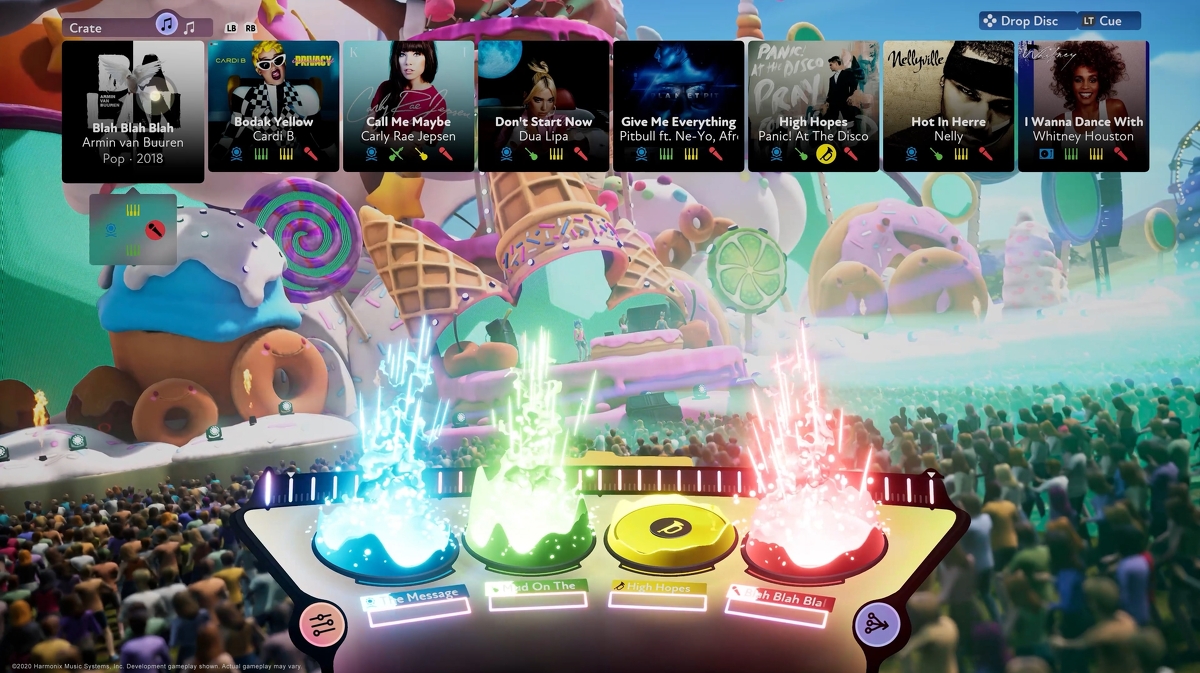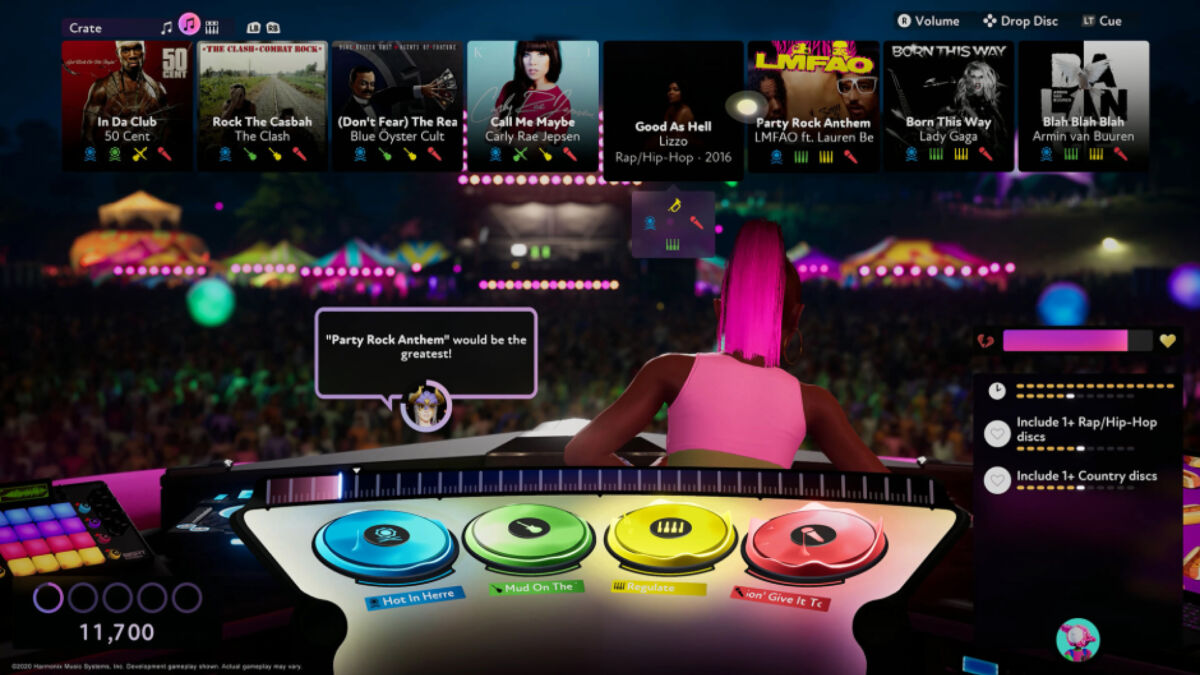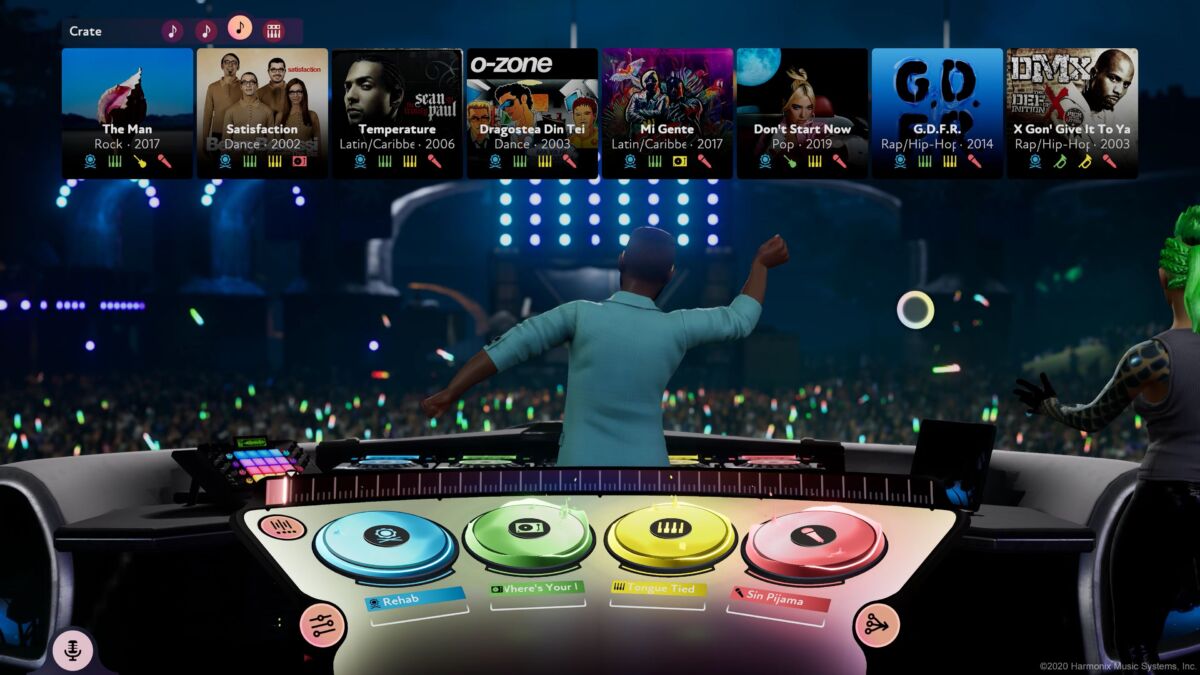
The music rhythm game once reigned supreme. Gamers rushed out to buy the latest installments of Rock Band and Guitar Hero, spending hundreds of dollars on plastic peripherals and DLC to expand their library. I should know because I was one of them and have enjoyed practically every entry in both franchises. But now Harmonix has developed a new music game that doesn’t need any extra instruments or accessories. Instead, players just need to use a standard controller as they take on the role of a DJ mixing various songs together live on stage.
The basics of Fuser are that users have four different record players that they can drop discs onto, with each player representing a different colour. These colours represent different instruments from a song, with red generally being used for vocals and blue for drums. The aim is to create mashups of various songs by combining different elements. That means you could have 50 Cent’s “In Da Club” playing alongside Lady Gaga’s “Born This Way.”

At any time, players can drop different discs onto the record players, with a wide choice of songs available for each set. As you progress through the campaign, more complicated controls are slowly introduced. This includes being able to mute a disc without removing it from the player or to isolate a particular disc so that only it can be heard. But even with these added elements, Fuser remains pretty accessible and easy to play. It also simplifies the art of being a DJ, automatically adjusting the tempo and tones of various song parts so that they blend together well.
Thanks to the rather basic gameplay and the tech working in the background, almost every creation sounds pretty good. There’s never a moment where mashing together four bizarre song choices leads to something that is unlistenable. That’s definitely for the best, though, as it means that you are free to experiment away as much as you want without fear of damaging your ears. The other benefit is that it has allowed Harmonix to add bonus objectives into each set, such as having two pop songs playing at the same time, without spoiling the musical experience.

Like previous games such as Rock Band, Fuser uses a five-star system to score how well players have done. But unlike in other music titles, exactly how the system works is never made explicitly clear. From the tutorial section, it’s obvious that certain factors affect how many points you can get. Fulfilling requests from the crowd, carrying out objectives, and dropping discs on a downbeat or another appropriate moment are all things that will boost the rating. Yet, even if you nail all of these factors, it is impossible to tell how many stars you will get and this can definitely lead to a loss of motivation. Without knowing where to improve or what to do differently, Fuser loses some of its appeal.
Another problem with Fuser is that much of the content is locked behind a progression system that feels largely unnecessary. Why a game like this needs to assign the player a level and unlock content in a manner similar to Fortnite is not immediately obvious. It just adds layers of unwanted fluff to the experience for the sake of it. As a consequence, most of the 100 or so songs included are not available at the start and need to be bought with in-game credits or unlocked when you reach a certain level.

Speaking of music, Fuser has a rather eclectic library of songs. There’s everything from classic R&B tracks from the likes of Otis Redding to rock songs from bands such as Pixies and Rage Against the Machine. Other genres include hip hop, dance, pop, country, and latin, meaning there will be something for every type of music fan. Regardless of how many of the songs you actually like in Fuser, the ability to mix in at least a couple of your favourites with the other tracks ensures players should always be able to find some enjoyment.
Players will spend the majority of their time in the campaign mode, especially at the start. That’s because it basically acts as an extended tutorial, teaching you how to play the game and introducing more and more gameplay mechanics. This works surprisingly well so that you never feel overwhelmed by everything, something that almost certainly would be the case if you just jumped in without getting to grips with the basics first.
https://www.youtube.com/watch?v=OmIOlZDUblw
However, there’s also lots of stuff to do outside of the campaign. The freestyle mode lets you mix songs without worrying about hitting a certain score or completing objectives. It is here that Fuser feels more like a music creation tool rather than a game, letting players practice their skills and really put together unique sets based on their favourite songs. Alongside these are a few multiplayer options, including competitive and co-op modes. The head-to-head battle game type is arguably the best, allowing you to test out your skills against another player. Timing is essential as the player who drops discs to the beat most accurately will rack up the points, creating intense matches.
Anyone who has played any of Harmonix’s other games will recognize the visual style in Fuser. The characters have a very similar look to those in Rock Band, although they do appear to be slightly more realistic and have more detail. A deep character creation tool allows players to personalise their own DJ fairly accurately, although there are also some outlandish options for those who don’t want to recreate an authentic look. Meanwhile, the lighting and special effects all look great, with the various stages looking very lively during your performances. The only slight technical issue is that the loading times can be quite lengthy.
In many respects, Fuser is very impressive. It makes what is seemingly a very complicated and dedicated profession seem rather easy, with the game putting together vastly different songs in a pleasing manner. But it also lacks a compelling gameplay hook that draws you in. In fact, Fuser can often feel more like a piece of software designed for creating music rather than a game. With other music and rhythm games, the drive to beat your previous score and perfect a song is what keeps players coming back. With that missing in Fuser, it’s difficult to remain enthralled with it for much longer than a few hours unless you really want to create and share musical creations.
A code for Fuser was provided by PR for the purposes of this review.
Some of the coverage you find on Cultured Vultures contains affiliate links, which provide us with small commissions based on purchases made from visiting our site.


